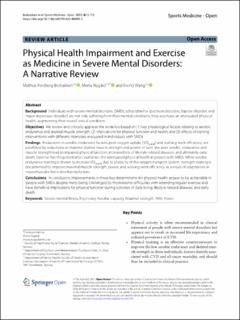| dc.contributor.author | Brobakken, Mathias Forsberg | |
| dc.contributor.author | Nygård, Mona | |
| dc.contributor.author | Wang, Eivind | |
| dc.date.accessioned | 2023-01-26T10:11:09Z | |
| dc.date.available | 2023-01-26T10:11:09Z | |
| dc.date.created | 2022-09-19T11:13:59Z | |
| dc.date.issued | 2022 | |
| dc.identifier.citation | Sports Medicine - Open. 2022, 8, 1-19. | en_US |
| dc.identifier.issn | 2198-9761 | |
| dc.identifier.uri | https://hdl.handle.net/11250/3046535 | |
| dc.description.abstract | Background: Individuals with severe mental disorders (SMDs; schizophrenia spectrum disorders, bipolar disorder, and major depressive disorder) are not only suffering from their mental conditions; they also have an attenuated physical health, augmenting their overall critical condition. Objectives: We review and critically appraise the evidence based on (1) key physiological factors relating to aerobic endurance and skeletal muscle strength; (2) implications for physical function and health; and (3) effects of training interventions with different intensities evaluated in individuals with SMDs. Findings: Reductions in aerobic endurance factors, peak oxygen uptake (VO2peak) and walking work efficiency, are paralleled by reductions in maximal skeletal muscle strength and power. In turn, the poor aerobic endurance and muscle strength lead to impaired physical function, increased risk of lifestyle-related diseases, and ultimately early death. Exercise has the potential to counteract the attenuated physical health in people with SMDs. While aerobic endurance training is shown to increase VO2peak due to plasticity of the oxygen transport system, strength training is documented to improve maximal muscle strength, power, and walking work efficiency as a result of adaptations in neuromuscular force developing factors. Conclusions: In conclusion, improvements in these key determinants for physical health appear to be achievable in people with SMDs despite many being challenged by motivational difficulties with attending regular exercise and have beneficial implications for physical function during activities of daily living, lifestyle-related diseases, and early death. | en_US |
| dc.language.iso | eng | en_US |
| dc.relation.uri | https://doi.org/10.1186/s40798-022-00490-3 | |
| dc.rights | Navngivelse 4.0 Internasjonal | * |
| dc.rights.uri | http://creativecommons.org/licenses/by/4.0/deed.no | * |
| dc.title | Physical health impairment and exercise as medicine in severe mental disorders : a narrative review | en_US |
| dc.type | Peer reviewed | en_US |
| dc.type | Journal article | en_US |
| dc.description.version | publishedVersion | en_US |
| dc.source.pagenumber | 1-19 | en_US |
| dc.source.volume | 8 | en_US |
| dc.source.journal | Sports Medicine - Open | en_US |
| dc.identifier.doi | 10.1186/s40798-022-00490-3 | |
| dc.identifier.cristin | 2053011 | |
| dc.source.articlenumber | 115 | en_US |
| cristin.ispublished | true | |
| cristin.fulltext | original | |
| cristin.qualitycode | 1 | |

